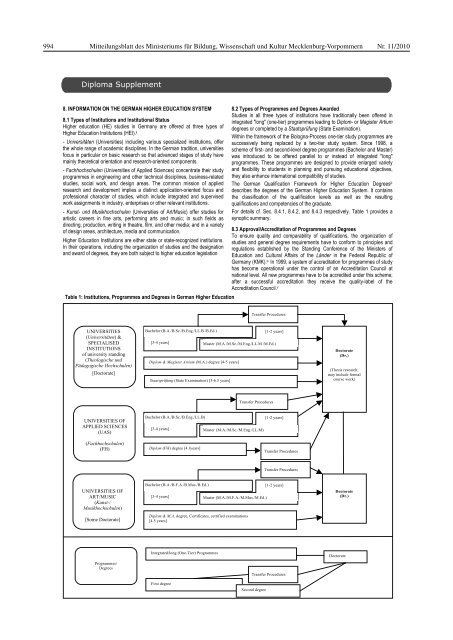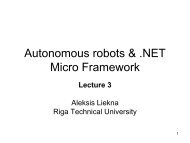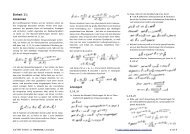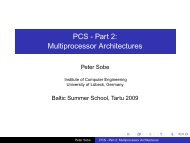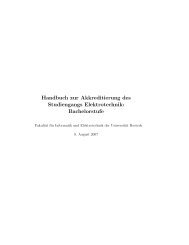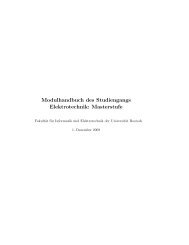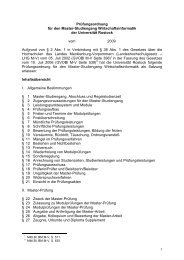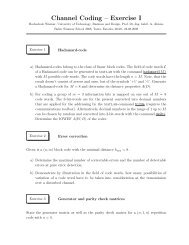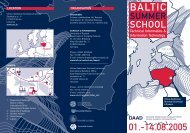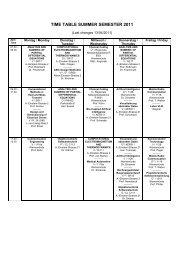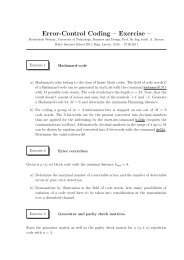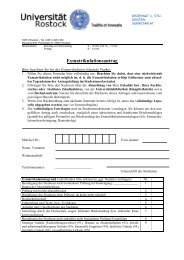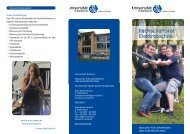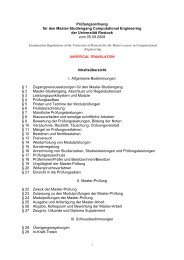Prüfungsordnung - Fakultät für Informatik und Elektrotechnik ...
Prüfungsordnung - Fakultät für Informatik und Elektrotechnik ...
Prüfungsordnung - Fakultät für Informatik und Elektrotechnik ...
Erfolgreiche ePaper selbst erstellen
Machen Sie aus Ihren PDF Publikationen ein blätterbares Flipbook mit unserer einzigartigen Google optimierten e-Paper Software.
994 Mitteilungsblatt des Ministeriums für Bildung, Wissenschaft <strong>und</strong> Kultur Mecklenburg-Vorpommern Nr. 11/2010<br />
Diploma Supplement<br />
Diploma Supplement<br />
8. INFORMATION ON THE GERMAN HIGHER EDUCATION SYSTEM i<br />
8.1 Types of Institutions and Institutional Status<br />
Higher education (HE) studies in Germany are offered at three types of<br />
Higher Education Institutions (HEI). ii<br />
- Universitäten (Universities) including various specialized institutions, offer<br />
the whole range of academic disciplines. In the German tradition, universities<br />
focus in particular on basic research so that advanced stages of study have<br />
mainly theoretical orientation and research-oriented components.<br />
- Fachhochschulen (Universities of Applied Sciences) concentrate their study<br />
programmes in engineering and other technical disciplines, business-related<br />
studies, social work, and design areas. The common mission of applied<br />
research and development implies a distinct application-oriented focus and<br />
professional character of studies, which include integrated and supervised<br />
work assignments in industry, enterprises or other relevant institutions.<br />
- Kunst- <strong>und</strong> Musikhochschulen (Universities of Art/Music) offer studies for<br />
artistic careers in fine arts, performing arts and music; in such fields as<br />
directing, production, writing in theatre, film, and other media; and in a variety<br />
of design areas, architecture, media and communication.<br />
Higher Education Institutions are either state or state-recognized institutions.<br />
In their operations, including the organization of studies and the designation<br />
and award of degrees, they are both subject to higher education legislation<br />
Table 1: Institutions, Programmes and Degrees in German Higher Education<br />
8.2 Types of Programmes and Degrees Awarded<br />
Studies in all three types of institutions have traditionally been offered in<br />
integrated "long" (one-tier) programmes leading to Diplom- or Magister Artium<br />
degrees or completed by a Staatsprüfung (State Examination).<br />
Within the framework of the Bologna-Process one-tier study programmes are<br />
successively being replaced by a two-tier study system. Since 1998, a<br />
scheme of first- and second-level degree programmes (Bachelor and Master)<br />
was introduced to be offered parallel to or instead of integrated "long"<br />
programmes. These programmes are designed to provide enlarged variety<br />
and flexibility to students in planning and pursuing educational objectives,<br />
they also enhance international compatibility of studies.<br />
The German Qualification Framework for Higher Education Degrees iii<br />
describes the degrees of the German Higher Education System. It contains<br />
the classification of the qualification levels as well as the resulting<br />
qualifications and competencies of the graduate.<br />
For details cf. Sec. 8.4.1, 8.4.2, and 8.4.3 respectively. Table 1 provides a<br />
synoptic summary.<br />
8.3 Approval/Accreditation of Programmes and Degrees<br />
To ensure quality and comparability of qualifications, the organization of<br />
studies and general degree requirements have to conform to principles and<br />
regulations established by the Standing Conference of the Ministers of<br />
Education and Cultural Affairs of the Länder in the Federal Republic of<br />
Germany (KMK). iv In 1999, a system of accreditation for programmes of study<br />
has become operational <strong>und</strong>er the control of an Accreditation Council at<br />
national level. All new programmes have to be accredited <strong>und</strong>er this scheme;<br />
after a successful accreditation they receive the quality-label of the<br />
Accreditation Council. v<br />
Transfer Procedures<br />
UNIVERSITIES<br />
(Universitäten) &<br />
SPECIALISED<br />
INSTITUTIONS<br />
of university standing<br />
(Theologische <strong>und</strong><br />
Pädagogische Hochschulen)<br />
[Doctorate]<br />
[Doctorate]<br />
Bachelor (B.A./B.Sc./B.Eng./LL.B./B.Ed.)<br />
[1-2 years]<br />
[3-4 years]<br />
Master (M.A./M.Sc./M.Eng./LL.M./M.Ed.)<br />
Diplom & Magister Artium (M.A.) degree [4-5 years]<br />
Staatsprüfung (State Examination) [3-6.5 years]<br />
Doctorate<br />
(Dr.)<br />
(Thesis research;<br />
may include formal<br />
course work)<br />
Transfer Procedures<br />
UNIVERSITIES OF<br />
APPLIED SCIENCES<br />
(UAS)<br />
Bachelor (B.A./B.Sc./B.Eng./LL.B)<br />
[1-2 years]<br />
[3-4 years]<br />
Master (M.A./M.Sc./M.Eng./LL.M)<br />
(Fachhochschulen)<br />
(FH)<br />
Diplom (FH) degree [4 Jyears]<br />
Transfer Procedures<br />
Transfer Procedures<br />
UNIVERSITIES OF<br />
ART/MUSIC<br />
(Kunst-/<br />
Musikhochschulen)<br />
[Some Doctorate]<br />
Bachelor (B.A./B.F.A./B.Mus./B.Ed.)<br />
[3-4 years]<br />
Master (M.A./M.F.A./M.Mus./M.Ed.)<br />
Diplom & M.A. degree, Certificates, certified examinations<br />
[4.5 years]<br />
[1-2 years]<br />
Doctorate<br />
(Dr.)<br />
Programmes/<br />
Degrees<br />
Integrated/long (One-Tier) Programmes<br />
First degree<br />
Transfer Procedures<br />
Second degree<br />
Doctorate<br />
Universität Rostock Seite 4 von 5


